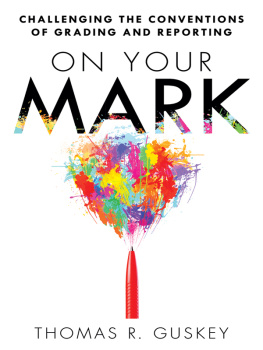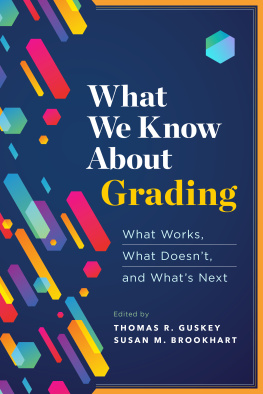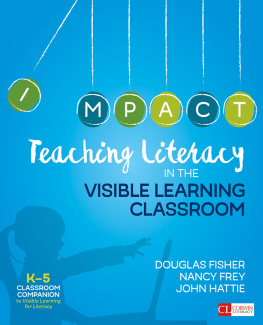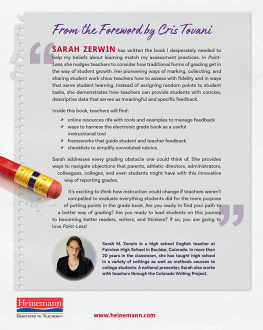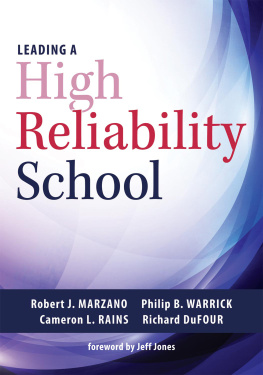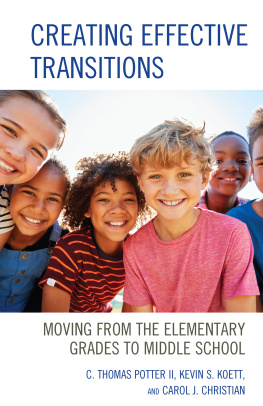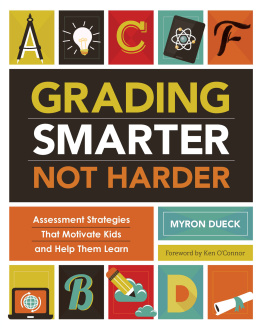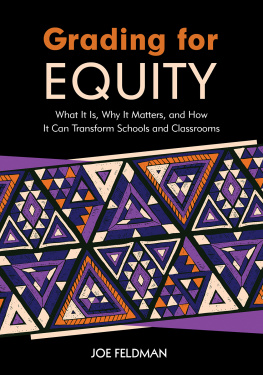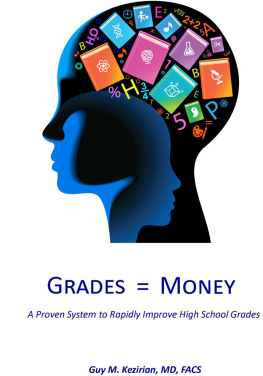
ON YOUR MARK
CHALLENGING THE CONVENTIONS OF GRADING AND REPORTING
THOMAS R. GUSKEY

Copyright 2015 by Solution Tree Press
All rights reserved, including the right of reproduction of this book in whole or in part in any form.
555 North Morton Street
Bloomington, IN 47404
800.733.6786 (toll free) / 812.336.7700
FAX: 812.336.7790
email:
solution-tree.com
Printed in the United States of America
18 17 16 15 14 1 2 3 4 5

Library of Congress Cataloging-in-Publication
Data Guskey, Thomas R.
On your mark : challenging the conventions of grading and reporting / Thomas R. Guskey.
pages cm.
Includes bibliographical references and index.
ISBN 978-1-935542-77-3 (perfect bound) 1. Grading and marking (Students)--United States. 2. School reports--United States. 3. Educational evaluation--United States. I. Title.
LB3060.37.G895 20145
371.272--dc23
2014017325
Solution Tree
Jeffrey C. Jones, CEO
Edmund M. Ackerman, President
Solution Tree Press
President: Douglas M. Rife
Editorial Director: Lesley Bolton
Managing Production Editor: Caroline Weiss
Proofreader: Elisabeth Abrams
Text and Cover Designer: Laura Kagemann
Acknowledgments
T his book is dedicated to three groups of people who provide constant inspiration. First are my family and special friends who constantly show me patience and love greater than I deserve. They see my faults as temporary and help me strive to be better. Second are all the wonderful teachers and school leaders who love helping their kids learn and have the courage to challenge traditions that stand in their way. And third are my former students whom I inadvertently hurt through my poor grading practices before I knew better. I hope they know that I am truly sorry for what I did and will do my best to ensure that no other teacher repeats the mistakes I made.
Solution Tree Press would like to thank the following reviewers:
Myron Dueck
Vice Principal
Summerland Secondary School
Summerland, British Columbia, Canada
Jean Hoffmann
Associate Principal
Wauwatosa East High School
Wauwatosa, Wisconsin
Louis Lim
Vice Principal
Thornhill Secondary School
Thornhill, Ontario, Canada
Ken OConnor
Education Consultant
Scarborough, Ontario, Canada
Ryan Reed
Seventh- and Eighth-Grade Social Studies Teacher
China Middle School
China, Maine
Patricia Scriffiny
Math Teacher
Montrose High School
Montrose, Colorado
Table of Contents
About the Author

Thomas R. Guskey, PhD, is a professor of educational psychology in the College of Education at the University of Kentucky. A graduate of the University of Chicago, he began his career in education as a middle school teacher, served as an administrator in the Chicago Public Schools, and was the first director of the Center for the Improvement of Teaching and Learning, a national research center.
Dr. Guskey is the author/editor of twenty books and numerous book chapters, articles, and professional papers on educational measurement, evaluation, assessment, and grading. He coedited the Experts in Assessment series. His articles have appeared in prominent research journals, as well as Educational Leadership, Phi Delta Kappan, and School Administrator.
Dr. Guskey served on the Policy Research Team of the National Commission on Teaching & Americas Future and on the task force to develop the National Standards for Staff Development, and he was named a Fellow in the American Educational Research Associationone of the associations highest honors. He was recently awarded Learning Forwards Distinguished Contributions to the Field Award and is the only person to have won that groups Book of the Year Award twice and its Article of the Year Award three times. He also has been featured on the National Public Radio programs Talk of the Nation and Morning Edition. In his work with educators throughout the world, he helps teachers and school leaders understand the important implications of research in education and offers practical solutions to some of educations most challenging problems.
To learn more about Dr. Guskeys work, visit .
To book Dr. Guskey for professional development, contact Solution Tree at .
Introduction
Y ou just opened what may be the most challenging and unsettling book you will ever read about any education topic. This book is not for anyone whos comfortable with the status quo in education. Its not for those who trust in traditions and find it easy to ignore research evidence that challenges those traditions. Its not for the weak of spirit.
This book wont be an easy or comfortable read. The school leaders, professors, teachers, instructors, board members, community members, and parents who read this book wont be talking about it in calm and casual tones. More likely, theyll be engaged in heated arguments and impassioned debates.
Some readers will find the ideas described in this book to be so difficult to accept that theyll dismiss them outright. A handful may even suggest that the very premise of these ideas is ridiculous. Others will acknowledge the validity of the ideas but feel theyre helpless to do anything about it. Still others will experience a profound sense of sadness and guilt when they realize that dedicated educators have unwittingly ignored the adverse consequences of policies and practices related to these ideas for decades.
But hopefully among readers there also will be a few who recognize the truth in these ideas, see the compelling need for change, and are willing to take the bold and courageous steps required to make improvements. With any luck, you are among them.
Why would a book about a topic in education prompt such intense but dissimilar emotional responses? How could any book in education be so controversial? The reason is simple: We are going to challenge some of educations deepest and longest held traditions. Were going to call into question ideas that many people consider to be basic tenets of our education system. Specifically, were going to take a long, hard, honest, and uncensored look at the way we grade students in schools and report their learning progress.
Many aspects of grading and reporting reflect traditions that have been a part of our education system since the time our great-grandparents were in school. These traditions are entrenched in our education culture and are a part of nearly everyones school experiences. Some of our experiences with grades were distinctly positive, especially when a grade provided affirmation of a job well done. But more often than not, these positive memories are overshadowed by recollections of negative experiences that evoke feelings of disappointment, embarrassment, and sometimes shame. Our negative experiences with grades profoundly affect us and sometimes are life altering.
Ironically, the problems associated with grading and reporting have been recognized for decades. Consider the following perspective on grades offered by I. E. Finkelstein:
Next page
